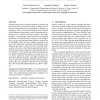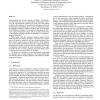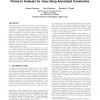146
click to vote
SAS
2010
Springer
15 years 12 days ago
2010
Springer
The efficiency of a points-to analysis is critical for several compiler optimizations and transformations, and has attracted considerable research attention. Despite several advanc...
120
click to vote
OOPSLA
2010
Springer
15 years 12 days ago
2010
Springer
Inclusion-based points-to analysis provides a good trade-off between precision of results and speed of analysis, and it has been incorporated into several production compilers inc...
115
click to vote
SAS
2000
Springer
15 years 5 months ago
2000
Springer
Abstract We carry out an experimental analysis for two of the design dimensions of flow-insensitive points-to analysis for C: polymorphic versus monomorphic and equality-based vers...
104
click to vote
PLDI
2000
ACM
15 years 5 months ago
2000
ACM
Most compiler optimizations and software productivity tools rely on information about the effects of pointer dereferences in a program. The purpose of points-to analysis is to com...
117
click to vote
SIGSOFT
1998
ACM
15 years 6 months ago
1998
ACM
Understanding large software systems is difficult. Traditionally, automated tools are used to assist program understanding. However, the representations constructed by these tool...
171
click to vote
OOPSLA
2001
Springer
15 years 6 months ago
2001
Springer
The goal of points-to analysis for Java is to determine the set of objects pointed to by a reference variable or a reference object field. This information has a wide variety of ...
128
click to vote
PLDI
2003
ACM
15 years 7 months ago
2003
ACM
This paper reports on a new approach to solving a subset-based points-to analysis for Java using Binary Decision Diagrams (BDDs). In the model checking community, BDDs have been s...
107
click to vote
CC
2005
Springer
15 years 7 months ago
2005
Springer
We introduce a new approach, called completeness analysis, to computing points-to sets for incomplete Java programs such as library modules or applications in the presence of dynam...
132
click to vote
OOPSLA
2005
Springer
15 years 7 months ago
2005
Springer
We present a points-to analysis technique suitable for environments with small time and memory budgets, such as just-in-time (JIT) compilers and interactive development environmen...
112
click to vote
ICSM
2005
IEEE
15 years 7 months ago
2005
IEEE
Distributed applications provide numerous advantages related to software performance, reliability, interoperability, and extensibility. This paper focuses on distributed Java prog...



